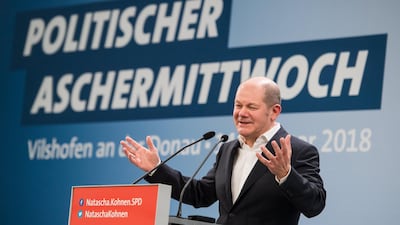Germany’s stumbling efforts to install a new coalition government under the leadership of Angela Merkel remains on track despite a grassroots rebellion that led to the downfall of one of the country’s most prominent politicians, analysts said Wednesday.
A deal struck last week between Mrs Merkel’s conservatives and long-term rivals the Social Democrats (SPD) to end more than four months of political deadlock has been followed by anger and recriminations over the compromises both parties had to make to remain in power.
The discontent resulted in the forced resignation of Martin Schulz, who stepped down as leader of the centre-left SPD on Tuesday after only a year in charge.
His resignation capped a week that started with him tipped to become foreign minister of a new administration but ended with a likely return to the backbenches. His authority had been eroded after reneging on an earlier promise not to take part in a new coalition with Mrs Merkel.
The departure is likely to soothe anger within the Social Democrats and make it more likely that the party’s 460,000 rank-and-file members will vote to approve the coalition deal, analysts said. The results of the poll are due out in early March.
Opposition to a grand coalition deal has been led by the party’s youth wing and its charismatic leader Kevin Kühnert, 28, who has been tipped as a future SPD leader.
He has called for a spell in opposition after the party’s worst ever showing in elections after spending eight of the last 12 years as part of a coalition government. His supporters were also angered that the party would be working with an anti-immigration rival who was set to take control of the country’s interior ministry.
Analysts said Mr Kühnert, who said he has been inspired by the campaign of Bernie Sanders in the US, did not yet have enough sway over the rump membership of the party to win the vote on the coalition.
“With Mr Schulz gone, a lot more people will be optimistic about the coalition,” said Leopold Traugott a policy analyst for the Open Europe think tank. “In the longer term they might have the chance to change the direction of the party, but I don’t think they have enough sway to move the party now.”
________________
Read more:
Angela Merkel left weakened after striking new coalition deal
Merkel defies her critics and vows to govern for full four-year term
________________
The failure of SPD members to back the deal would likely spark a new election or force Mrs Merkel to attempt to rule at the head of a minority coalition.
In a sign of the chaos engulfing the 154-year-old SPD, senior members squabbled over Mr Schulz’s replacement as leader.
Olaf Scholz, the man tipped to be finance minister in a new coalition government, will take temporary charge before a new leadership vote in April. His hold over the party is likely to be short with the April vote tipped to return the popular parliamentary leader Andrea Nahles as leader.
Mr Scholz called on party members to back the coalition deal on Wednesday, claiming that it provided the best opportunity to build a closer German-French partnership to reform the European Union.
“The window of opportunity is now, not in five or 10 years - maybe then it won't be there any more,” he told party members in Bavaria. “We need to act now.”
Gesine Loetzsch, a senior opposition lawmaker, told Bloomberg that she anticipated SPD members would vote to back the coalition to stem the continuing decline in support.
But she warned that the government would not have the broad support of Germans and continued failures to form a government had eroded trust in national politics.
The authority of Mrs Merkel, Europe’s most dominant figure of the 21st century, has waned following her party’s poor showing at last year’s national elections which saw a spike in support for nationalists who opposed her migration policies.
She was forced to hand over control of the finance ministry to the SPD in the division of portfolios agreed as part of the coalition negotiations. Critics of the deal, led by Mr Kühnert, said that while Mrs Merkel remained chancellor, she would veto any SPD fiscal policies she didn’t like.

